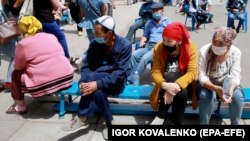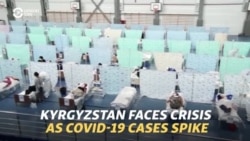Twenty-one-year-old Adinai Murzabekova died on the job. A volunteer student doctor working in a temporary COVID-19 hospital in Bishkek, the Kyrgyz capital, she suddenly felt unwell one day this week. Before long, she was dead.
“We went to the station where the ambulances usually stand, and requested their help, but they refused. Turns out, there’re people like that …” recounted one of Murzabekova’s colleagues, Nurgul Atageldiyeva, another volunteer student doctor at the hospital. “Because of this, probably, we lost her.”
The official autopsy for Murzabekova’s July 13 death showed double pneumonia – often diagnosed among doctors who treat coronavirus patients.
Murzabekova’s workmates, however, rejected this diagnosis, noting the absence of any signs of pneumonia. Rather, less than three weeks before her 22nd birthday, they say, their colleague became another statistic in Kyrgyzstan’s growing COVID-19 crisis.
As of July 16, Kyrgyzstan’s official coronavirus cases had increased within a week by 41 percent to 12,498 – the highest percentage increase in Eurasia and the sixth highest in the world, according to data, adjusted for population, compiled by Johns Hopkins University and published by The Washington Post.
Kyrgyzstan’s official COVID-19 death rate remains relatively low – as of July 16, 167 deaths since March -- but some doctors have disputed the accuracy of that number since cases of community-acquired pneumonia have been recorded separately from COVID-19.
Those numbers could now increase still further: On July 16, Deputy Prime Minister Aida Ismayilova announced that data about COVID-19 and community-acquired pneumonia would be combined, so that Kyrgyzstan has “a unified approach” for the treatment of COVID-19 symptoms.
Seeing to the logistics to slow the pandemic, however, remains a challenge.
The recent spike in infections – 3,651 new cases since July 9 -- can be seen in the Muslim and Christian funeral rites that now take place in the very courtyard of Bishkek’s morgue. Or in the lack of beds and protective equipment in hospitals and affordable medicine in the city’s pharmacies.
With public frustration growing, Kyrgyz Prime Minister Kubatbek Boronov on July 11 summoned doctors from 25 publicly funded medical facilities back from vacation. The government plans to provide 400 new hospital beds, but the shortage of medical personnel is “acute,” he acknowledged.
Most of Kyrgyzstan’s deaths now occur at home “because the lion’s share of those in need of hospitalization cannot be admitted to hospitals,” commented Bermet Baryktabasova, a specialist in evidence-based medicine, a field of clinical methodology.
To compensate for that lack of hospital beds, outpatient facilities have been opening at the rate of several every day or two in the capital, Bishkek, but “[t]here are not enough staff, there are not enough medicines, there are not enough medical supplies to manage [patients with] COVID,” Baryktabasova cautioned.
Bishkek general surgeon Ermek Ismayilov is one of 30 local physicians who host consultations on the Telegram messaging app in a bid to provide at least preliminary medical advice to those in need. The group’s channel now has 12,000 subscribers, he said.
He attributes the lack of medical personnel to a shortage of protective equipment and the shortfall in even basic medications like acetaminophen to panic buying.
Amidst that shortage, many Bishkek pharmacies have tripled or quadrupled their prices. In response, the Kyrgyz financial police have begun a series of raids and have threatened to release the names of suppliers and pharmacies accused of price gouging.
“The people should know who is taking advantage of the current epidemiological situation and trying to make money off citizens’ lives!” fumed a July 7 post on the service’s Facebook page.
To find what they need, many Kyrgyz now closely monitor the Telegram chat group Pharmapoisk (Pharmasearch), where updates can be found about deliveries of antibiotics or other medicines in short supply to Bishkek. Hundreds of people can reportedly turn up at a pharmaceutical warehouse once news of a delivery appears on Pharmapoisk.
The lyrics of one popular song have been adapted to reflect this situation: “We will not forget this summer; There was neither the sea, nor a brigantine; We were looking in Bishkek for ventilators and (the anticoagulant) heparin.”
Prime Minister Boronov stressed on July 16 that imported medicine would soon be arriving to end the shortage. Purchases are planned from China, Iran, India, Pakistan, and Russia. He urged citizens not to buy up medicine “on the off chance” that they will not be able to find what they need.
For the government, calming those concerns is also politically urgent: President Jeenbekov has set parliamentary elections for October 4.
But it appears that Kyrgyzstan’s coronavirus problem may not lessen any time soon.
The country is “heading toward the peak” of the pandemic, surgeon Ismayilov warned on July 9, “but we haven’t reached it yet.” He estimates that the climax could occur sometime before mid-August.
Meanwhile, the bodies appear to be piling up at the Bishkek morgue.
Its management denies that the facility faces an overflow of corpses, but, without divulging specifics, they do concede that they are receiving an increased number of COVID-19 fatalities.
Outside the morgue, one elderly Bishkek woman in a straw sunhat commented this week that both cars and people routinely crowd the site in the mornings.
“There are really very many people here … and they also bring little ones …” observed the woman, who gave her name as Irina. “You’ll catch the coronavirus faster here than elsewhere.”
As elsewhere in Central Asia, the Kyrgyz tradition of multiple family members coming to collect the body of a loved one and see last rites performed can add to the crush. While many have temporarily stopped holding massive funerals, seeing 20 to 30 people arrive at the Bishkek morgue to claim a body is not unusual.
Media are no longer allowed inside the facility, which has been declared a “red zone” that is unsafe for journalists to enter, the city’s chief pathologist, Valentina Pakhman, stated on Facebook.
She denied, though, that the restriction was imposed “because we have something to hide.”
“[A] desperate panic,” Pakhman remarked in a later interview with 24.kg, “will never lead to anything good.”







